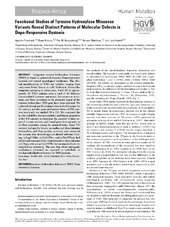| dc.contributor.author | Fossbakk, Agnete | en_US |
| dc.contributor.author | Kleppe, Rune | en_US |
| dc.contributor.author | Knappskog, Per | en_US |
| dc.contributor.author | Martinez, Aurora | en_US |
| dc.contributor.author | Haavik, Jan | en_US |
| dc.date.accessioned | 2014-12-09T09:00:14Z | en_US |
| dc.date.accessioned | 2014-12-09T20:36:08Z | en_US |
| dc.date.accessioned | 2014-12-11T10:09:32Z | |
| dc.date.available | 2014-12-11T10:09:32Z | |
| dc.date.issued | 2014-06-03 | eng |
| dc.identifier.issn | 1059-7794 | |
| dc.identifier.uri | https://hdl.handle.net/1956/8909 | |
| dc.description.abstract | Congenital tyrosine hydroxylase deficiency (THD) is found in autosomal-recessive Dopa-responsive dystonia and related neurological syndromes. The clinical manifestations of THD are variable, ranging from early-onset lethal disease to mild Parkinson disease-like symptoms appearing in adolescence. Until 2014, approximately 70 THD patients with a total of 40 different disease-related missense mutations, five nonsense mutations, and three mutations in the promoter region of the tyrosine hydroxylase (TH) gene have been reported. We collected clinical and biochemical data in the literature for all variants, and also generated mutant forms of TH variants previously not studied (N = 23). We compared the in vitro solubility, thermal stability, and kinetic properties of the TH variants to determine the cause(s) of their impaired enzyme activity, and found great heterogeneity in all these properties among the mutated forms. Some TH variants had specific kinetic anomalies and phenylalanine hydroxylase, and Dopa oxidase activities were measured for variants that showed signs of altered substrate binding. p.Arg233His, p.Gly247Ser, and p.Phe375Leu had shifted substrate specificity from tyrosine to phenylalanine and Dopa, whereas p.Cys359Phe had an impaired activity toward these substrates. The new data about pathogenic mechanisms presented are expected to contribute to develop individualized therapy for THD patients. | en_US |
| dc.language.iso | eng | eng |
| dc.publisher | Wiley | eng |
| dc.relation.ispartof | <a href="http://hdl.handle.net/1956/12988" target="blank">Human tyrosine hydroxylase: Oxygen dependence and role in Dopa responsive dystonia</a> | |
| dc.rights | Attribution-NonCommercial-NoDerivs CC BY-NC-ND | eng |
| dc.rights.uri | http://creativecommons.org/licenses/by-nc-nd/3.0/ | eng |
| dc.subject | tyrosine hydroxylase deficiency | eng |
| dc.subject | THD | eng |
| dc.subject | Dopa responsive dystonia | eng |
| dc.title | Functional studies of tyrosine hydroxylase missense variants reveal distinct patterns of molecular defects in dopa-responsive dystonia | en_US |
| dc.type | Peer reviewed | |
| dc.type | Journal article | |
| dc.date.updated | 2014-12-09T09:00:15Z | en_US |
| dc.description.version | publishedVersion | en_US |
| dc.rights.holder | Copyright 2014 The Authors | |
| dc.identifier.doi | https://doi.org/10.1002/humu.22565 | |
| dc.identifier.cristin | 1153994 | |
| dc.source.journal | Human Mutation | |
| dc.source.40 | 35 | |
| dc.source.14 | 7 | |
| dc.source.pagenumber | 880-890 | |
| dc.subject.nsi | VDP::Medical sciences: 700::Basic medical, dental and veterinary sciences: 710::Medical genetics: 714 | eng |
| dc.subject.nsi | VDP::Medisinske fag: 700::Basale medisinske, odontologiske og veterinærmedisinske fag: 710::Medisinsk genetikk: 714 | nob |

